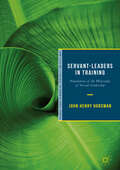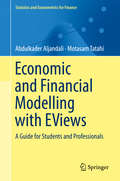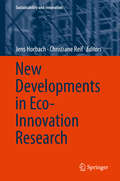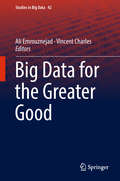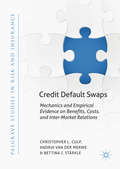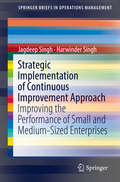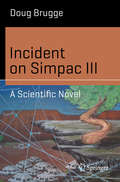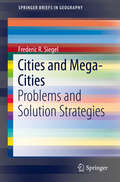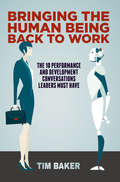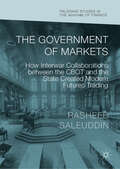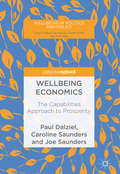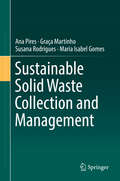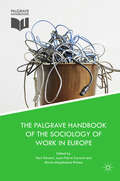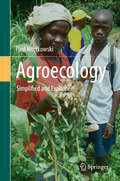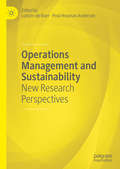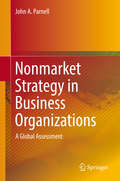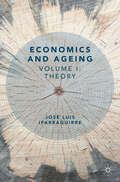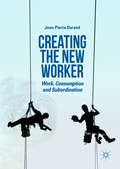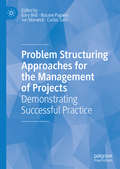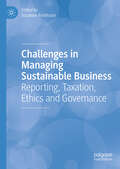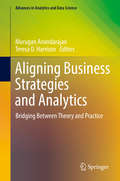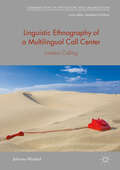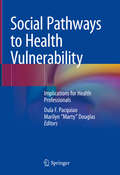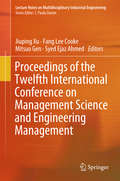- Table View
- List View
Servant-Leaders in Training: Foundations of the Philosophy of Servant-Leadership (Palgrave Studies in Workplace Spirituality and Fulfillment)
by John Henry HorsmanGuided by and complimenting the writings of Robert K. Greenleaf, this book aims to deepen, expand and extend the philosophy of servant-leadership. Proposing a grounding framework for the studies of leadership, training and development, the author suggests that servant-leadership is primarily based on the structures of human development. Emphasizing the notion of a developing servant-consciousness and explaining the composition of a servant-leader disposition, this book analyzes the way that leadership has evolved. The characteristics of a servant-leader are categorized into five primary capacities, each with a focus on holistic listening and path-finding foresight. Servant-leaders in Training is essential reading for scholars of organizational leadership and management, and those wishing to gain a deeper understanding of servant-leader philosophy more generally.
Economic and Financial Modelling with EViews: A Guide for Students and Professionals (Statistics and Econometrics for Finance)
by Abdulkader Aljandali Motasam TatahiThis practical guide in Eviews is aimed at practitioners and students in business, economics, econometrics, and finance. It uses a step-by-step approach to equip readers with a toolkit that enables them to make the most of this widely used econometric analysis software. Statistical and econometrics concepts are explained visually with examples, problems, and solutions.Developed by economists, the Eviews statistical software package is used most commonly for time-series oriented econometric analysis. It allows users to quickly develop statistical relations from data and then use those relations to forecast future values of the data. The package provides convenient ways to enter or upload data series, create new series from existing ones, display and print series, carry out statistical analyses of relationships among series, and manipulate results and output. This highly hands-on resource includes more than 200 illustrative graphs and tables and tutorials throughout. Abdulkader Aljandali is Senior Lecturer at Coventry University in London. He is currently leading the Stochastic Finance Module taught as part of the Global Financial Trading MSc. His previously published work includes Exchange Rate Volatility in Emerging Markers, Quantitative Analysis, Multivariate Methods & Forecasting with IBM SPSS Statistics and Multivariate Methods and Forecasting with IBM® SPSS® Statistics. Dr Aljandali is an established member of the British Accounting and Finance Association and the Higher Education Academy.Motasam Tatahi is a specialist in the areas of Macroeconomics, Financial Economics, and Financial Econometrics at the European Business School, Regent’s University London, where he serves as Principal Lecturer and Dissertation Coordinator for the MSc in Global Banking and Finance at The European Business School-London.
New Developments in Eco-Innovation Research (Sustainability and Innovation)
by Jens Horbach Christiane ReifEco-innovations are crucial for reducing the environmental damages arising from economic activities, and are one of the main drivers of a successful transition towards sustainable development and remedying essential climate change problems. This book provides an overview of recent advances in the rapidly growing field of eco-innovation research, adopts an interdisciplinary perspective and outlines the main future developmental trends. A broad range of topics are addressed, including a bibliometric analysis of eco-innovation research, the relationship between eco-innovation and corporate sustainability, eco-innovation system analysis, new evidence on the economic effects of eco-innovation, and the relevance of policy and policy mixes for eco-innovation activities. The book is dedicated to Klaus Rennings, one of the most important representatives of this field, who unexpectedly passed away in September 2015.
Big Data for the Greater Good (Studies in Big Data #42)
by Ali Emrouznejad Vincent CharlesThis book highlights some of the most fascinating current uses, thought-provoking changes, and biggest challenges that Big Data means for our society. The explosive growth of data and advances in Big Data analytics have created a new frontier for innovation, competition, productivity, and well-being in almost every sector of our society, as well as a source of immense economic and societal value. From the derivation of customer feedback-based insights to fraud detection and preserving privacy; better medical treatments; agriculture and food management; and establishing low-voltage networks – many innovations for the greater good can stem from Big Data. Given the insights it provides, this book will be of interest to both researchers in the field of Big Data, and practitioners from various fields who intend to apply Big Data technologies to improve their strategic and operational decision-making processes.
Credit Default Swaps: Mechanics and Empirical Evidence on Benefits, Costs, and Inter-Market Relations (Palgrave Studies in Risk and Insurance)
by Christopher L. Culp Andria van der Merwe Bettina J. StärkleThis book, unique in its composition, reviews the academic empirical literature on how CDSs actually work in practice, including during distressed times of market crises. It also discusses the mechanics of single-name and index CDSs, the theoretical costs and benefits of CDSs, as well as comprehensively summarizes the empirical evidence on important aspects of these instruments of risk transfer. Full-time academics, researchers at financial institutions, and students will benefit from the dispassionate and comprehensive summary of the academic literature; they can read this book instead of identifying, collecting, and reading the hundreds of academic articles on the important subject of credit risk transfer using derivatives and benefit from the synthesis of the literature provided.
The Road to Wicked: The Marketing and Consumption of Oz from L. Frank Baum to Broadway
by Kent Drummond Susan Aronstein Terri L. RittenburgThe Road to Wicked examines the long life of the Oz myth. It is both a study in cultural sustainability— the capacity of artists, narratives, art forms, and genres to remain viable over time—and an examination of the marketing machinery and consumption patterns that make such sustainability possible. Drawing on the fields of macromarketing, consumer behavior, literary and cultural studies, and theories of adaption and remediation, the authors examine key adaptations and extensions of Baum’s 1900 novel. These include the original Oz craze, the MGM film and its television afterlife, Wicked and its extensions, and Oz the Great and Powerful—Disney’s recent (and highly lucrative) venture that builds on the considerable success of Wicked. At the end of the book, the authors offer a foundational framework for a new theory of cultural sustainability and propose a set of explanatory conditions under which any artistic experience might achieve it.
Strategic Implementation of Continuous Improvement Approach: Improving the Performance of Small and Medium-Sized Enterprises (SpringerBriefs in Operations Management)
by Jagdeep Singh Harwinder SinghThis book covers the strategic use of continuous improvement (CI) techniques for manufacturing performance improvement. It focuses primarily on strategies that can be adopted by small and middle-sized enterprises in manufacturing in order to meet the global challenges and competition. The book begins with an introduction to CI (or Kaizen), explaining different CI approaches and strategies. Chapter 2 offers a literature review of CI, examining conceptual frameworks, case studies, and surveys. Next, the book deals with the design of the study, detailing the work done in each phase along with the tools, techniques and models. Chapter 4 presents a detailed survey to determine the present status of continuous improvement strategies in the Indian manufacturing industry, to assess the important barriers that effect the implementation of CI strategies, and to also assess the role of key enablers leading to improve the performance of manufacturing operations. Chapter 5 is comprised of detailed case studies to further analyze the application of the discussed CI strategies. The purpose of Chapter 6 is to develop the relationship among the different identified most important barriers in implementing CI approach using interpretive structural modeling (ISM) and classify these barriers depending upon their driving and dependence power. Finally Chapter 7 provides conclusions, addresses potential limitations, and also looks to the future.
Incident on Simpac III: A Scientific Novel (Science and Fiction)
by Doug BruggeA few hundred years into the future, a wave of space colonization follows a disastrous earlier attempt to inhabit nearby extrasolar planets. It is guided by a new computational method based on massive data-driven socio-cultural and socio-epidemiological modeling and using novel biological computers, fed with data on Earth’s history of successes and failures. Yet, in the newly settled Simpac system, some unexpected and worrying anomalies begin cropping up, making an urgent expedition to the system necessary: is it the underlying data, the computations, or is some unknown entity tampering with the space colonization program? A race against time ensues as the lives of four strangers begin to converge. While grounded in the social systems aspect, the author posits that the future is likely to be characterized by more biology-based tools than most contemporary science fiction – which most often relies entirely on non-biological hardware in terms of advanced technologies – predicts. The result is an entertaining and skillful blend of thriller and SF, complemented by a nontechnical appendix describing the underlying science.
Cities and Mega-Cities: Problems and Solution Strategies (SpringerBriefs in Geography)
by Frederic R. SiegelThis book discusses existing and future global problems of physical, chemical, biological and societal origins faced by increasingly populated cities and mega-cities, and options to mitigate or eliminate them. In nine chapters, the book focuses on rehabilitation and redevelopment projects aimed at converting shantytowns/slums into well serviced neighborhoods via secure housing, clean piped water, adequate access to sanitation, and other amenities for good living conditions. Examples of rehabilitation (restore capacity, structures, efficiency) and redevelopment (redesign, rebuild, attract investment) are addressed in detail, as are the sources of major financing to support such projects and proposals. The final chapters also discuss problems faced by countries with contracting populations, and their viable solutions. The book will be of interest to academics, city planners, land-use planners, NGOs, and designers /architects specializing in urban development and redevelopment.
Bringing the Human Being Back to Work: The 10 Performance And Development Conversations Leaders Must Have
by Tim BakerFor the past 100 years, we’ve progressively dehumanized our places of work. We’ve learned to systemize, homogenize, and mechanize – all in the quest for greater efficiency and cost-saving. We’ve forgotten that the human being is the centre of work. This book highlights the ten essential performance and development conversations leaders must have to restore human spirit at work. First, it explains the importance of cultivating an authentic workplace by resisting the dumbing down of work and respecting employee dignity. Second, it presents five developmental conversations, from coaching to relationship-building. Third, it outlines five performance conversations, from climate review to innovation. An organization – any organization – is a group of people working together towards a common goal, but we tend to lose sight of this simple idea. Too often, human resources are lumped in with technological resources, administrative resources and financial resources. Managers become obsessed with processes, procedures and systems. Tim Baker provides leaders with a roadmap to bring the human being back to work.
The Government of Markets: How Interwar Collaborations Between The Cbot And The State Created Modern Futures Trading (Palgrave Studies in the History of Finance)
by Rasheed SaleuddinAbsent evidence to the contrary, it is usually assumed that US financial markets developed in spite of government attempts to regulate, and therefore laissez faire is the best approach for developing critically important and enduring market institutions. This book makes heavy use of extensive archival sources that are no longer publicly available to describe in detail the discussions inside the CBOT and the often private and confidential negotiations between industry leaders and government officials. This work suggests that, contrary to the accepted story, what we now know of as modern futures markets were heavily co-constructed through a meaningful long-term collaboration between a progressive CBOT leadership and an extremely knowledgeable and pragmatic US federal government. The industry leaders had a difficult time evolving the modern institutions in the face of powerful reactionary internal forces. Yet in the end the CBOT, by co-opting and cooperating with federal officials, led the exchange and Chicago markets in general to a near century of global dominance. On the federal government side, knowledgeable technocrats and inspired politicians led an information and analysis explosion while interacting with industry, both formally and informally, to craft better markets for all.
Wellbeing Economics: The Capabilities Approach to Prosperity (Wellbeing in Politics and Policy)
by Paul Dalziel Caroline Saunders Joe SaundersEconomists have long sought to maximise economic growth, believing this to be their best contribution to improving human welfare. That approach is not sustainable in the face of ongoing issues such as global climate change, environmental damage, rising inequality and enduring poverty. Alternatives must be found.This open access book addresses that challenge. It sets out a wellbeing economics framework that directly addresses fundamental issues affecting wellbeing outcomes. Drawing inspiration from the capabilities approach of Nobel Prize winner Amartya Sen, the book demonstrates how persons can enhance prosperity through their own actions and through collaboration with others.The book examines national public policy, but its analysis also focuses on choices made by individuals, households, families, civil society, local government and the global community. It therefore offers important insights for anyone concerned with improving personal wellbeing and community prosperity.
Sustainable Solid Waste Collection and Management
by Maria Isabel Gomes Susana Rodrigues Graça Martinho Ana PiresThis volume focuses on the collection of waste and waste streams as an integral aspect of sustainable waste management. The authors take economic models and behavioral studies into account to go beyond just descriptions of waste collections technologies and collection route design. Models and tools for sustainable waste collection are described in detail, and the authors provide a comprehensive, integrated methodology to design waste collection systems that reduce environmental impacts, are economically viable, and achieve buy-in and participation from target populations. Part I of the book provides fundamentals and context on waste hierarchy, including waste prevention, reduction and reuse, waste collection itself, and steps such as preparation for recycling, recycling, treatment, and landfilling. Background in environmental, social, and economic concerns surrounding waste collection is also provided here. Part II addresses tools for design, operation, and maintenance of waste collection systems. Part III focuses on how the tools presented in Part II can be used to support sustainability assessments and decisions that consider the entire life cycle of waste and the role of waste collection programs in waste prevention, reduction, reuse, recycling, treatment, and disposal. Part IV addresses the challenges of developing sustainable waste management systems and addresses the role of waste collection in sustainable waste management in the future.
The Palgrave Handbook of the Sociology of Work in Europe
by Paul Stewart Jean-Pierre Durand Maria-Magdalena RicheaThis book explores the key conceptual features of the development of the Sociology of Work (SoW) in Europe since 1945, using eleven country case studies.An original contribution to our understanding of the trajectory of the SoW, the chapters map the current state of the theoretical background of the sub-discipline's development to broader socio-political and economic changes, traced across a heterogeneous set of national contexts.Different definitions of the SoW in each country often reflect variations in the focus of analysis, and these chapters link the subject definition and focus to other social science disciplines, the state, as well as social class interests and ideologies. The book contends that the ways in which the sub-discipline makes sense of changes in work is itself a response to the type of society in which the sub-discipline is practiced, whether in the post-war social democratic West, the Soviet East, or today's societies, dominated by variant forms of neo-liberalism. It will be of use to scholars and students interested in the transnational history of the discipline of sociology, with a specific focus on the nexus between the sociology of labour, ideology, economics and politics.
Agroecology: Simplified and Explained
by Paul WojtkowskiThis book presents the core elements that underwrite agroecology. Expressed across twelve chapters, the universality of the core is the essence of agroecology. This alone would be of interest to researchers, students, and academics. Furthermore, the book contains a long, detailed, and inclusive glossary that, with over 160 entries, elaborates on the topics presented. Included are recent developments as well as time-tested, traditional farm practices. The book also advances the theoretical base, fills gaps in the published research, and suggests future opportunities and future directions. The book is internationally oriented, presenting both temperate and tropical agriculture. The book begins by comparing agroecology against conventional, monoculturally-based agriculture. In doing so, it defines the unique features of agroecology and their significance in achieving sustainable and environmentally-friendly agriculture. The book goes on to discuss the underlying technologies, the various manifestations of biodiversity, and the risk countermeasures associated with agroecology. This includes the farm landscape as a positive base for ecology, and how, if used well, it can produce major economic growth. The book concludes by summarizing the key findings, and assessing the macro-challenges facing agroecology.
Operations Management and Sustainability: New Research Perspectives
by Luitzen De Boer Poul Houman AndersenThis edited book presents cutting edge international research in operations management sustainability and topical research themes. As the sustainability agenda gains greater prominence and momentum throughout society, business actors and stakeholders are increasingly concerned with the impact of current business operations. There is a growing need for OM research and practice which reflects these concerns. Based on demands from industry and society at large, universities and schools now develop academic programs which are meant to serve this need – yet there is no clear and manifest research program concerning OM and sustainability. This book is of use to both researchers orientating themselves in this new and exciting field and educators seeking inspiration to develop new courses.
Nonmarket Strategy in Business Organizations: A Global Assessment
by John A. ParnellThis book explores nonmarket strategy (NMS) in firms by invoking economic, political and philosophical perspectives. Featuring data from the USA, the UK, India, China, Mexico and other countries, the author links NMS to economic freedom, regional development, corruption and other national factors. Nonmarket strategy (NMS) refers to any part of a firm’s strategy that seeks to generate superior performance through means not directly associated with market activity, such as lobbying legislators, colluding with rivals to erect industry entry barriers and pursuing direct business-government partnerships. Decades ago, nonmarket factors comprised a minor, peripheral consideration in organizational strategy. Today, NMS is central to strategy development and execution. This phenomenon is driven by both corruption in emerging economies and cronyism in the developed world. Scholarly interest in NMS continues to increase and while much is known about the topic, some core questions still remain such as: Are there different drivers for and implications of proactive NMS versus defensive NMS? How do national environments influence firm decisions to pursue NMS? The data presented in the book explores many of these questions. Providing a comprehensive, multidisciplinary analysis that includes elements of management, economics, philosophy and social sciences, this book is beneficial for scholars, practitioners, students, academics and policy makers interested in NMS.
Economics and Ageing
by José Luis IparraguirreThis upper level textbook provides a coherent introduction to the economic implications of individual and population ageing. Placing economic considerations into a wider social sciences context, this is ideal reading not only for advanced undergraduate and masters students in economics, health economics and the economics of ageing, but also policy makers, students, professionals and practitioners in gerontology, sociology, health-related sciences and social care.This volume introduces the different conceptualisations of age and definitions of `old age', as well as the main theories of individual ageing as developed in the disciplines of biology, psychology and sociology. It covers the economic theories of fertility, mortality and migration and describes the four main frameworks that can be used to study economics and ageing, namely the life cycle, the overlapping generations, the perpetual youth and the dynastic models.
Creating the New Worker: Work, Consumption and Subordination
by Jean-Pierre DurandThis book explores the relationship between the changing nature of capitalism and the creation of the new worker. In a changing global economy, work - as the activity that structures individuals in capitalism both socially and psychologically - is being undermined. Combining a Gramscian critique of contemporary patterns of capitalist labour control with Lacanian psychoanalysis, Durand examines what kinds of human beings are emerging in and through modern work, or on its margins. Creating the New Worker will be of interest to students and scholars who engage in the sociology and psychology of work, economics, and labour.
Problem Structuring Approaches for the Management of Projects: Demonstrating Successful Practice
by Gary Bell Rosane Pagano Jon Warwick Carlos SatoExploring the three levels of project management, this edited collection analyses the practice of problem structuring approaches (PSAs) with an aim to improve organisational adaptability and value creation. By studying these approaches, the authors present techniques for enhancing project management knowledge, informing decision-making and guiding management actions. This book is an insightful and timely read, as it addresses the need for organisations to adapt in order to tackle new challenges within today’s changing business landscape. Undoubtedly useful to those studying project management and operational research, this book is also an important read for managers and decision-makers within organisations as it identifies and examines the effective outcomes of PSAs.
Challenges in Managing Sustainable Business: Reporting, Taxation, Ethics and Governance
by Susanne ArvidssonOver the past 30 years sustainability has become increasingly important to scholarly research and business in practice. This book explores a variety of challenges faced by businesses when becoming sustainable and how this links to economic development and its corruption, ethical and taxation implications. Showcasing an interdisciplinary approach, the chapters explore topics such as business ethics, corporate responsibility, tax governance and sustainability practice.
Aligning Business Strategies and Analytics: Bridging Between Theory And Practice (Advances In Analytics And Data Science Ser. #1)
by Teresa D. Harrison Murugan AnandarajanThis book examines issues related to the alignment of business strategies and analytics. Vast amounts of data are being generated, collected, stored, processed, analyzed, distributed and used at an ever-increasing rate by organizations. Simultaneously, managers must rapidly and thoroughly understand the factors driving their business. Business Analytics is an interactive process of analyzing and exploring enterprise data to find valuable insights that can be exploited for competitive advantage. However, to gain this advantage, organizations need to create a sophisticated analytical climate within which strategic decisions are made. As a result, there is a growing awareness that alignment among business strategies, business structures, and analytics are critical to effectively develop and deploy techniques to enhance an organization’s decision-making capability. In the past, the relevance and usefulness of academic research in the area of alignment is often questioned by practitioners, but this book seeks to bridge this gap.Aligning Business Strategies and Analytics: Bridging Between Theory and Practice is comprised of twelve chapters, divided into three sections. The book begins by introducing business analytics and the current gap between academic training and the needs within the business community. Chapters 2 - 5 examines how the use of cognitive computing improves financial advice, how technology is accelerating the growth of the financial advising industry, explores the application of advanced analytics to various facets of the industry and provides the context for analytics in practice. Chapters 6 - 9 offers real-world examples of how project management professionals tackle big-data challenges, explores the application of agile methodologies, discusses the operational benefits that can be gained by implementing real-time, and a case study on human capital analytics. Chapters 10 - 11 reviews the opportunities and potential shortfall and highlights how new media marketing and analytics fostered new insights. Finally the book concludes with a look at how data and analytics are playing a revolutionary role in strategy development in the chemical industry.
Linguistic Ethnography of a Multilingual Call Center: London Calling (Communicating In Professions And Organizations Ser.)
by Johanna WoydackThis book presents an innovative institutional transpositional ethnography that examines the textual trajectory of “the life of a calling script” from production by corporate management and clients to recontextualization by middle management and finally to application by agents in phone interactions. Drawing on an extensive original research it provides a behind-the-scenes view of a multilingual call center in London and critiques the archetypal modern workplace practices including extensive use of monitoring and standardization and use of low-skilled precariat labor. In doing so, it offers fresh perspectives on contemporary debates about resistance, agency, and compliance in globalized workplaces. This study will provide a valuable resource to students and scholars of management studies, communication, sociolinguistics, and linguistic anthropology.
Social Pathways to Health Vulnerability: Implications for Health Professionals
by Dula F. Pacquiao Marilyn Marty" DouglasPrimarily intended for DNP and PhD students in nursing and health care who are expected to design research to identify health-related problems and solutions, this book focuses on the concepts, theories and processes of how social determinants affect the health of populations. Using specific social determinants as an organizing framework, it presents ample scientific evidence from health and social disciplines of the universal processes that produce the social patterning of health inequities. This book is organized into three major parts, beginning with the social pathways to health vulnerability, followed by research methods and subsequently frameworks for action. The methods section provides selected research approaches suitable for studying the impact of social variables on population health, as well as the outcomes of multilevel interventions. Each chapter provides an in-depth presentation of relevant theoretical knowledge and research-based examples of work conducted in the area. The book addresses the specific implications for health professional leaders such as nurses or health policy makers, highlighting their role in achieving macrosocial changes to promote health among specific vulnerable populations. Both of the book’s editors are prominent and highly respected scholars in their field. The team of authors is highly multidisciplinary, including experts from the fields of medicine, public health, education and epidemiology who have conducted research on the social determinants of population health. Combining their varied perspectives, this book offers a valuable resource for graduate students (PhD, MD, DNP, MSN, etc.), faculty, researchers and clinicians in health professions.
Proceedings of the Twelfth International Conference on Management Science and Engineering Management (Lecture Notes on Multidisciplinary Industrial Engineering)
by Jiuping Xu Mitsuo Gen Fang Lee Cooke Syed Ejaz AhmedThis proceedings book is divided in 2 Volumes and 8 Parts. Part I is dedicated to Decision Support System, which is about the information system that supports business or organizational decision-making activities; Part II is on Computing Methodology, which is always used to provide the most effective algorithm for numerical solutions of various modeling problems; Part III presents Information Technology, which is the application of computers to store, study, retrieve, transmit and manipulate data, or information in the context of a business or other enterprise; Part IV is dedicated to Data Analysis, which is a process of inspecting, cleansing, transforming, and modeling data with the goal of discovering useful information, suggesting conclusions, and supporting decision-making; Part V presents papers on Operational Management, which is about the plan, organization, implementation and control of the operation process; Part VI is on Project Management, which is about the initiating, planning, executing, controlling, and closing the work of a team to achieve specific goals and meet specific success criteria at the specified time in the field of engineering; Part VII presents Green Supply Chain, which is about the management of the flow of goods and services based on the concept of “low-carbon”; Part VIII is focused on Industry Strategy Management, which refers to the decision-making and management art of an industry or organization in a long-term and long-term development direction, objectives, tasks and policies, as well as resource allocation.
